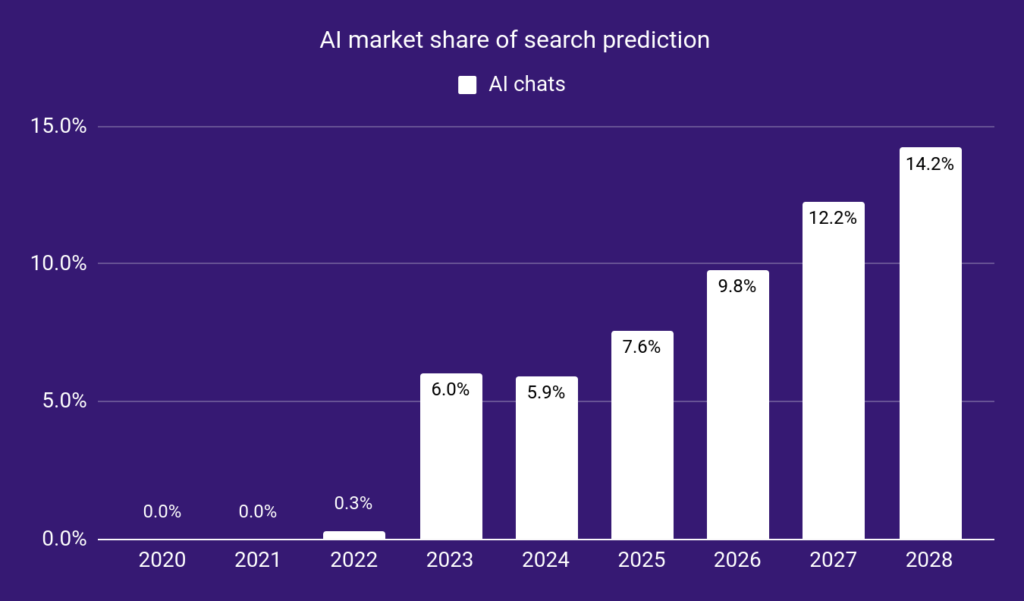The Rapid Rise of LLM-Powered Search: Temporary fashion or a revolution?


The world of online search is undergoing a foundational transformation. Traditional search engines like Google and Bing are no longer the sole gatekeepers of information retrieval. Instead, Large Language Model (LLM) tools — such as ChatGPT, Perplexity, Claude, and Gemini - are reshaping how users access and interact with knowledge. Unlike conventional search, Generative Search delivers direct, synthesized answers instead of a list of links, changing user expectations and behaviors in the process.
This shift is not just anecdotal. It’s measurable, accelerating, and, as the data reveals, points to a future where Generative Search overtakes traditional methods. To remain visible and relevant in this new landscape, businesses must prepare with Generative Engine Optimization (GEO) — a strategic approach that ensures content is structured, authoritative, and machine-readable so it can be accurately interpreted and surfaced by AI models. GEO isn’t a replacement for SEO, it’s its next evolution.
Key LLM search platforms are experiencing remarkable growth in their active user numbers, clearly illustrating this transformative trend:
The impact of this growing user base is starting to reflect in the overall search traffic landscape.
While traditional engines still lead, their market share stopped growing or dramatically decreased in the last year:
In addition, there seems to be some dissatisfaction among Google search users. As mentioned by John Kiernan, a search engines expert from Wallet Hub:
The quality of Google search results in the personal finance vertical has been declining for years, according to WalletHub data.
The decline in Google search quality could be the result of poor execution or honest mistakes [...]

Looking ahead, predictive models suggest a significant shift in the coming years.
Projections based on current growth indicate a potential timeline for LLM search to rival traditional methods:

LLM search is rapidly gaining ground, and the shift from traditional engines won’t just disrupt search—it will redefine how users expect to find information.
As user behaviour shifts toward conversational AI search, traditional SEO strategies need to evolve. This is where Generative Engine Optimization (GEO) comes into play:
Adapting to GEO ensures your blog stays visible and trusted as LLMs favor structured, authoritative, and educational content over traditional keyword-focused SEO.
Search isn't just evolving - it's fragmenting. Google and other traditional leaders are now threatened by LLM-powered platforms that are growing in daily utility, usage and trust.
The evidence is clear. A REVOLUTION is happening:
If your content isn’t optimized for LLMs, your brand could become invisible in the next generation of search.
Now is the time to embrace GEO - to future-proof your content strategy and ensure you're not just found on traditional search engines, but also a hot pick in the responses of TODAY's leading AI tools.

GEO is not a replacement for SEO—it’s an evolution of how users interact with information online.
While SEO (Search Engine Optimization) focuses on ranking content in traditional search engines like Google, GEO (Generative Engine Optimization) focuses on making content discoverable and useful within AI-powered search and assistant experiences.
Here’s how they differ and work together:
As AI assistants increasingly become the first touchpoint for information retrieval, GEO is becoming essential. But SEO is still critical for attracting traffic from search engines and building long-term domain authority.
In short: GEO enhances your content’s AI-readiness, while SEO ensures it’s search-engine-ready. The future is not SEO or GEO—it’s SEO and GEO, working in tandem.
AI Search Optimization refers to the practice of structuring, formatting, and presenting digital content to ensure it is surfaced by AI systems—particularly large language models (LLMs)—in response to user queries.Choosing a clear, unified name for this emerging field is crucial because it shapes professional standards, guides tool development, informs marketing strategies, and fosters a cohesive community of practice. Without a consistent term, the industry risks fragmentation and inefficiency, much like early digital marketing faced before "SEO" was widely adopted.
Generative Engine Optimization (GEO) is becoming increasingly critical as user behavior shifts toward AI-native search tools like ChatGPT, Gemini, and Perplexity.
According with Bain, recent data shows that over 40% of users now prefer AI-generated answers over traditional search engine results.
This trend reflects a major evolution in how people discover and consume information.
Unlike traditional SEO, which focuses on ranking in static search results, GEO ensures that your content is understandable, relevant, and authoritative enough to be cited or surfaced in LLM-generated responses.
This is especially important as AI platforms begin to integrate live web search capabilities, summaries, and citations directly into their answers.
The urgency is amplified by user traffic trends. According to Similarweb data (see chart below), ChatGPT visits are projected to surpass Google’s by December 2026 if current growth continues.
This suggests that visibility in LLMs may soon be as important—if not more—than traditional search rankings.

Generative Engine Optimization (GEO), also known as Large Language Model Optimization (LLMO), is the process of optimizing content to increase its visibility and relevance within AI-generated responses from tools like ChatGPT, Gemini, or Perplexity.
Unlike traditional SEO, which targets search engine rankings, GEO focuses on how large language models interpret, prioritize, and present information to users in conversational outputs. The goal is to influence how and when content appears in AI-driven answers.